Chapter 6 A Major Industry for the North East
Soon after the beginning of World War 2, Major Seabrook, from the Seabrook Farms in the U.S.A. came to Australia to advise the Commonwealth Government on the growing and dehydration of vegetables. While he was talking with the Commonwealth on the building of dehydration factories, I played a major role with Tom Dalton (then Minister for Agriculture), Frank Hicks, and the Ward Brothers, of Smithton, in drawing up the first vegetable contracts in Australia. This made quite a story!
The Commonwealth, with their legal advisers and others, had prepared the first large-scale vegetable contract system Australia had ever known. Unfortunately, after canvassing of all States for some nine months, not one State would accept the contracts.
A well-attended meeting was held at Scottsdale, with people present from all parts of the State, including Mr. Dalton, the Common- wealth Director of Agriculture, Mr. Bulicock, and many others.
I had quite a lot to say, pointing out that they were drawing up a tonnage contract, which was the wrong approach. Some areas and some farmers, I said, would grow five tons of carrots per acre, while other areas and other farmers would grow 50 tons per acre. I pointed out that farmers, being optimistic, would all sign up for the maximum of 50 tons, as otherwise they would not necessarily be able to sell their surplus. Therefore, while on paper they would have enough vege- tables to feed the Australian and American troops, in actual fact they would probably be lucky to. get 20 per cent of their required produc- tion.
A gentleman from Canberra retorted that they were not fools and they would travel around Australia informing farmers of the tonnage their paddocks would grow. I commented that I was pleased there was a man in Canberra who could accurately forecast these crops; there was certainly not one in any other state! This caused a good laugh, and after another hour of general discussion I suggested they burn their whole contract, which was unworkable, and just draw up a new one.
After the meeting Tom Dalton asked me to go to Hobart to draw
upvegetable contracts forAustralia. At first I said I couldn't, but, after
Uncle Don said to me, You only need horse sense and not brains to
draw up a fair and sensible vegetable growing contract for Australia
,
I agreed to go. The Ward brothers of Smithton insisted that they
accompany me, as they considered I was very young.
After some six hours of work on the contract we submitted it to Mr. Dalton. Tom was hopeful it could be accepted by all Australian States within three weeks, as the matter was extremely urgent. We suggested we would pay for it to be sent by lettergram to all State Ministers and this was done, but paid for by the Government, and all State Ministers for Agriculture met in Melbourne. Within 48 hours of its being drawn up it was accepted unanimously by all states, and remained in operation for the duration of the war.
At a meeting at Moltema, at which Major Seabrook spoke, I realised what a big operator he was; it must have been about 1939 or 1940. I was really 'goggle eyed' when he spoke about his pea viners shelling a million pounds of peas a day and his 8000 steers eating the waste pea trash. He spoke also of 400 tractors and trucks connected by two-way radio with his main office. It took many years for two-way radio to become a feature of Australian agriculture. In our case it was 33 years before we had such a system installed in our office, tractors and road vehicles.
When I visited Major Seabrook in 1956 he was the biggest vegetable grower in the world. He asked an attractive girl - Jean was her name - to show me around. 'After travelling in the plane you must be tired and would appreciate some nice company,' he said. I thanked Jean, but it appeared that this was not sufficient, so I asked her if she would like to have tea with me. She was very pleased and rushed to tell her husband where to get his meal from the freezer. He thought it was normal for me to show his wife this courtesy, whereas, in Australia at that time, to ask a man's wife out for dinner and leave him to go home on his own and get his own meal would not have seemed proper.
When Major Seabrook was advising the Commonwealth Gov- ernment he said he would prefer to give all the vegetable contracts to a few progressive young farmers, who, he thought, would be able to mass-produce vegetables quickly to help feed the Allied and American troops. Mew and Athol McLennan, Vince Salier, Herbert Nicholls and I were invited to a private meeting and asked to undertake the growing of all the required vegetables. One member was, and is, a good farmer, but considered to be rather conservative, and he thought it was too big a project. One or two others also queried whether five of us would be able to mass-produce the stipulated 1000 acres of vegetables. At that time there were very few tractors in Tasmania; we were all still using horses. I guess we may have all been just buying or considering buying our first tractors. I personally thought we could grow the quantity, because the Government talked about supplying us with a total of 40 tractors of various sizes - big tractors and small hand- operated ones. However, from a personal point of view, I thought it would be unsatisfactory, because of having to use our own farms and resources. If we failed, everyone would quite naturally say it served us right for being greedy and taking all the contracts (not that it was our idea). If, on the other hand, we were successful and profited from the project, people would say that we could not help but make money, having been given all the vegetable contracts. So, win or lose, to me it was an unsatisfactory situation.
Therefore, I was one who recommended that contracts be let to anyone capable of producing these vegetables. Only as a last resort would! be happy about being one of the five with all the contracts. So the suggestion was accepted and contracts were let to various people. But it is interesting that the five of us who were prepared to organise school girls and boys tff help us, ended up growing 2000 acres of vegetables, including potatoes, in a free market situation. Unfortu- nately, the original suggestion created a lot of ill-feeling in the district and throughout the North-East for many years. Apparently someone confidentially told one of his staff that the five of us might be growing all the vegetables in the North-East, and, it being wartime, the rumours flew all over the area.
Donald McLennan, father of Athol and Mew, went to an ordinary farmers meeting at Ringarooma and found the farmers furious. They had heard the rumour and we were now known as the 'Big 5'. They were afraid that we were going to commandeer their properties and operate all the farms in the North-East! That is how rumour had exaggerated the position.
One farmer, who owned a big property and had a number of sons, was very vocal at the meetings. However, it is interesting that when itwas a free market he applied for fouranda half acres of parsnips only. He and his family did not have the knack of helping and encouraging the school children, who chopped out parsnips. His operation was therefore totally uneconomical. He could not get enough labour to weed the crop and, with all the other work he had to do, he let the parsnips go and they were ploughed in.
During this time there were no such things as selective sprays in Tasmania. All vegetables had to be hand-weeded, although towards the end of the war we were experimenting with the spraying of carrots with kerosene in their early stage. However, we found that if they were a little too advanced the kerosene taste remained and the carrots were no good.
We had six Italian prisoners working with us during the latter part of the war. Three were at West Scottsdale and three in our huts at Melaleuca Park, on the Forester River. The wages for these people were really quite low, but employers' reactions were varied and sometimes made the employment of prisoners quite uneconomical. For example, a fairly well-to-do family employing one Italian really spoilt him. If he looked a little weary the daughters would tell him to lie down and rest while they made him a drink of cordial!
These young fellows in their twenties were well able to stand a
reasonable day's work. At the other extreme, however, if they didn't
want to do what they were told or were too slow in doing it, some odd
people would comment, If I had a bayonet they would do as they were
told
. These were extreme cases, but they did occur. As far as I could
see, the main problem with employing Italian prisoners of war, was
that they were expected to work on their own at jobs in which they were
not experienced. This caused embarrassment to both parties and many
prisoners were returned.
When our prisoners came they had lived on our type of army rations, and they longed for such items as macaroni, tomato sauce and meat. They asked me if it would be possible to have two packets of spaghetti, one bottle of tomato sauce and a certain amount of meat in their weekly rations. I forget the actual amount. I replied that, as they were doing a good job, they could have two bottles of tomato sauce and ten packets of spaghetti. Spaghetti was only fourpence a packet, and cheap food.
They asked me not to make fun of them, but I gave them twice
as much as they asked for and they soon had their fill. They said to me,
Not so much meat; we catch rabbits and fish - and not so much tomato
sauce
. They had satisfied their longing and were more than happy
with reasonable amounts.
However, one landowner, who watched his money very care- fully, thought it was a mistake to give them what they asked for, so he halved every request and they were still extremely hungry for these familiar items of food. So they asked for four times as much as they needed, knowing it would always be cut down. He kept them only a short time, saying no-one could afford to feed them, as they were so greedy. But he missed out on having really goo4 men at a time when there was an extreme shortage of labour. At that time we were using up to 70 boys and girls aged from seven to 15 years at weekends and on school holidays.
Fourteen school boys and myself dug 3,400 bags of carrots with forks, during a twoweekMay holiday. Ourseniorstaff, includinggirls were cutting and bagging part of the 13,000 chaff bags of cabbages forwarded. Also my other men were hand digging 100 acres of potatoes at West Scottsdale. They were a terrific lot of youngsters and all later made good citizens. Kevin Haas, the Stagg brothers, Rex James, Peter Osborne, Bill Howroyd, Daisy Johnson and dozens of others never missed work on a Saturday. They took their responsibilities of growing food for the war effort very seriously. When our three prisoners came to us (we were not allowed more) I mentioned that while they lived and worked with us we would treat them exactly the same as our own gang; they would be part of it. I expected them to do any job I would do, but I would not ask them to do anything I would not do. With this philosophy they all turned out to be good workers and did a good job.
Many farmers returned their prisoners because they sent them into a back paddock to do a dif ficult job on their own, with poor results or they thought it cost too much to keep them. The Italians could not understand that owners of properties worked as hard as their men. At that time, I guess, I was one of the best potato planters in our district and worked hard - and in addition had to do my book work. They did not consider I should work. 'You should sit down and tell all the men what to do,' they said, adding that in India, where they had been prisoners-of-war for varying times of a year or more, British officers had said, 'You do this. You no do it, bang, you are dead.'
We were too motivated towards work and progress to be just 'bosses' and of course we had no money. We were making real progress, but certainly had no time to be idle and conceited in any way with what we had done.
I remember at that time we had a young man in Scottsdale who
seemed extremely conceited and walked around the street looking
disdainfully at others he passed. I said to Merv McLennan, 'Why
should John Smith (not his actual name) be like he is? He is the only
conceited man in the district
. Merv said, Well, everyone wants to
be important and John is the only man in the area that cannot do
anything
. I said, Nonsense, John can - well I just can't think what
he can do, but he must be able to do something!
Merv answered
saying everyone else could shoot, play football, catch a fish, plough
a furrow, or do something useful, so they did not need to look
conceited, whereas John could do nothing, so he tried to make an
impression.
I think this is very true. Everyone wants to be needed and important, but not in a silly sense. The trouble today is many people consider they are not really needed. All our staff are really important people and others look up to them and admire what they are doing. It was about this time that the local Commercial Bank of Australia manager, Mr. Norm Saltmarsh rang me and asked if I would call. Norm was a terrific person and jealously guarded the Bank's interest as well as taking under his wing all the young chaps who were buying cars and things they could not afford. Norm told me I was £7,500 past my overdraft limit and secretly I was shattered, but said the real overdraft must be £12,500 in excess, because I had done so many successful projects! For a short period, my book keeping was not always up to date, and I had really thought I had accomplished everything within my limit! Norm rushed around checking that all cheques I mentioned had been cashed. I leaned back and said how satisfactory the whole position was, but I admitted I should have just informed him about this bit of excess. It does not do to unduly show your concern or panic spreads.
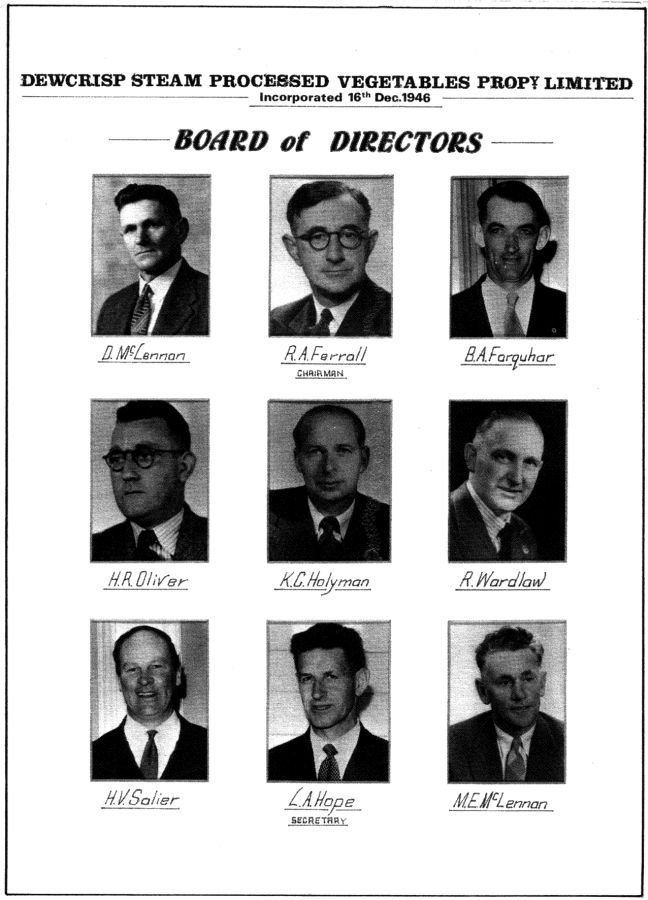
DEWCRISP STEAM PROCESSED VEGETABLES PROPY LIMITED
Incorporated 16th Dec 1946
Board of Directors
However, everything has to be soundly based; there is no future for anyone in 'kite flying' to help your finances. By having all my finances with the one source they knew the overall position was sound. Today some of our big people borrow in every direction and unfortu- nately their shareholders and even their banks have a problem in keeping in touch with reality.
Another amusing incident that took place at that time was in relation to a forged cheque. I had been writing out a lot of cheques on my knee in the paddock and the writing (always a bit hard to understand) was very poor. Peg told me I must be the worst writer in the state and so I sat down at the table and wrote a cheque out neatly. Looking at my scribble I realised she was right, so I did the right thing with this cheque. Norm called me on the phone to say he needed to see me immediately. I told him I was too busy to come to the office, but asked what was the problem; he told me I had had a cheque forged! I was intrigued, so jumped in the car and went into the office and there was my neatly written cheque! It took me a while to live down this episode.
On a private world trip in 19561 visited Seabrook Farms in the U.S.A., then the biggest vegetable growing and processing works in the world. Now, I have been told, they have crashed and the works are rotting.
In 1946, when the dehydration factories in Australia were being dismantled, a number of us suggested that the Tasmanian Government take over the Commonwealth Dehydration Factory at Scottsdale. Donald McLennan was very active in this project and he and I spent weeks gathering information to strengthen the case presented to the Tasmanian Government to keep the factory going. The issue was political dynamite, as every district in Australia wanted its own factory kept in operation.
My brother in Canberra, Dr. Reg Farquhar, was told by the Dehydration Board that the Government was going to 'squash' me for my silly idea that one factory could be kept going commercially; they thought it utter nonsense. However, we invited V.I.P.'s from Federal and State Parliaments, organisations and important citizens to a dinner of dehydrated food. Our wives, under the direction of Mrs. Donald McLennan, prepared the meal, which was so successful that it ruined all arguments against the proposal. Most of the opposition was based on the belief that dehydrated products were unpalatable, which was proved wrong, as everyone enjoyed their meal. Dehydrated apples were served for dessert.
At the meeting which followed big Department folders were not
even opened. Mter a discussion lasting an hour and a half Sir Robert
cosgrove, the Premier, said, Mr. Farquhar, you are sure one factory
can be kept going commercially?
I answered, Quite definitely, Mr.
Premier.
The Premier then said, 'For the benefit of the district and
State, the Government will buy the factory for its scrap sale value on
Monday morning (as we are entitled to do), and we will give you a five-
year free lease of it, with the Qption to buy at £9,500 (the purchase
price) at any time during the five-year period. We will also give you
a £10,000 guarantee at the bank on condition that you first form a com-
pany, raise £10,000 and run it yourselves.'
We were caught; we could not even discuss it. I said, 'Thanks, Mr. Premier, we will do that,' and sat down.
Then our problems really began. I started the ball rolling with £1,500 and other directors contributed the following amounts - Donald McLennan £500, Merv, Vince, Harry Oliver and Ray Ferrall £250 each. Donald McLennan and I went to see Keith Holyman, who put in £1000. Soon we had the £10,000
The company was registered as 'Dewcrisp Steam Processed Vegetables.' The term 'dehydration' was avoided because of poor presentation to servicemen. Later the name was changed to 'Dewcrisp Products'.
Then we branched into canning and freezing, and each time I told the directors I would collect the money by a due date for the expansion, it was done.
The first expansion programme involved £50,000, then £100,000, £150,000 and £200,000. Unfortunately, I had to fill the balance of each loan, mostly from my personal increased overdraft!
There is an interesting story about the last £1,800 of the loan. Mr. Harold Somerville, a very wealthy man who had no overdraft, was very willing to buy £1,800 worth of shares if I could arrange it with the bank. But because of a directive from Canberra that shares could not be bought with an overdraft his request was refused. I ended up buying them with a cheque to the bank, and it was six months later before I was game to tell the bank manager that I had actually bought these remaining shares from my overdraft! I made no charges for time or travelling in the collection of the £200,000 capital.
The factory expansion programme included building and installing machinery for canning and quick freezing of vegetables. Having no associate company to draw on for experience and lack of sufficient capital, we found this an almost impossible task - but only almost!
We could not afford advertising specialists, so I took a photo of a Bridport girl, Lesley Adams, holding some of our vegetables and used this on our labels (see illustration).
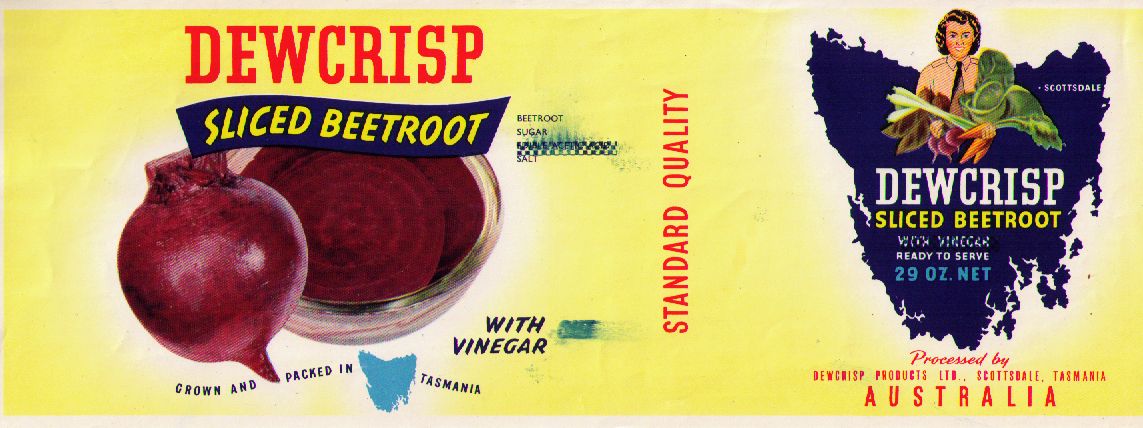
Dewcrisp labels were all locally designed.
I asked Leslie Adams from Bridport to hold some of my freshly harvested 'dewcrisp' vegetables while I took a photo.
It was developed as you see into very attractive labels.
Generally everything worked out wonderfully well, but not before we weathered another financial storm. The Commercial Bank (now Westpac) had tentatively agreed to increase our overdraft by £130,000 to cover our first year's pea canning season. However, before we could begin canning the peas, the worst canning slump for 20-odd years occurred, resulting in a number of canning factories going bankrupt. So the Commercial Bank withdrew their anticipated offer of an increased overdraft facility.
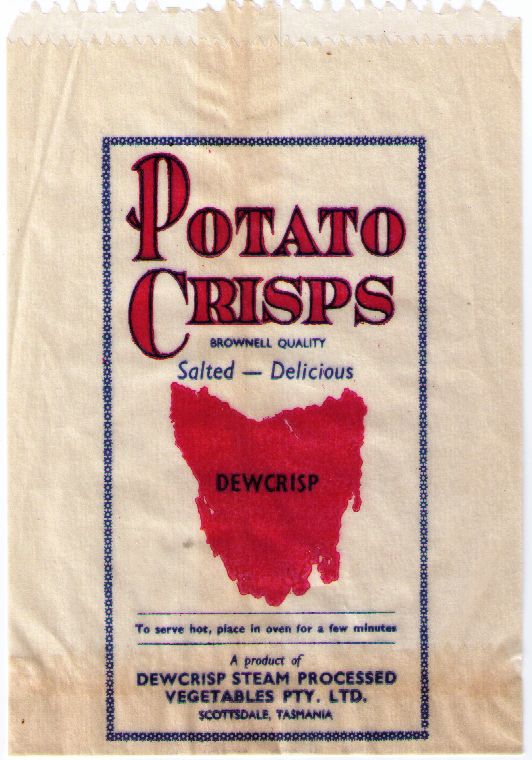
Dewcrisp hot chips bag
I asked the Prime Minister, Sir Robert Menzies, and the Federal Treasurer, Sir Arthur Fadden, for temporary Commonwealth Bank assistance, but the General Manager and staff of the Commonwealth Bank in Sydney, though very polite, thought we had no alternative but to go bankrupt.
I therefore called at Mr. Norman Gadsden's home in Melbourne, asking him to finance us for a year with £35,000 worth of tin plate in cans. I stayed the night and Norman Gadsden agreed.
I also saw Mr. Bill Davies, of 'The Mercury' in Hobart, requesting that his firm finance us with £8700 worth of labels and cartons over 12 months. After he considered my request and talked at the races with Bob Bird, manager of Herd & Co., he agreed.
I called a meeting of the farmers involved, informing them of the tough position and suggesting we pay for their peas at a rate of 25 per cent each six-weekly period instead of all within 14 days, and they agreed. So by the next directors' meeting I had deferred more than £100,000 of our commitments.
Even so, we still did not always have the cash to pay wages, and during this pea season I paid out of my personal overdraft up to £9,400 a fortnight to make up the full wages owing.
All who put money into the factory in the early days received at least double their money back, plus some dividends. It was a wonderful thing for the district. Scottsdale otherwise would not have bad the Research Centre and probably not the educational and health facilities it has now, because the farming and business communities would be on a smaller scale.
A progressive move by the company was the granting of a scholarship to John Beattie to study food processing at Hawkesbury College. John later became manager of our factory and still holds that position. He is a very capable manager.
Over the years the factory has grown into a major processing unit of great importance to Tasmania. With the opening of the Winnaleah irrigation scheme in 1987 and Government help with the factory expansion, its future is secure.
I was very keen to get a Research Centre established at Scottsdale,
but received very little support in the early stages. For instance, Mr.
Ray Ferrall, now Sir Raymond, said, Don't let us waste the board's
time discussing a dream. Mr. Farquhar can do what he likes with his
own time and money
. Ray was very practical and is a great
individual, but in this case he misjudged the situation.
We had a big lever to get the Research Centre, however. We were operating the only commercial factory in Australia processing vege- tables by dehydration, canning and quick freezing methods, and we were very successful. There had been five other Research centres, but all had been officially closed by the Federal Government together with the Scottsdale plant some years after operations began. However, I knew Sir John McEwen very well personally, and rang him. After considerable trips and discussions, John, with Senator McBride, Minister for Defence, decided to keep one centre open to carry on research.
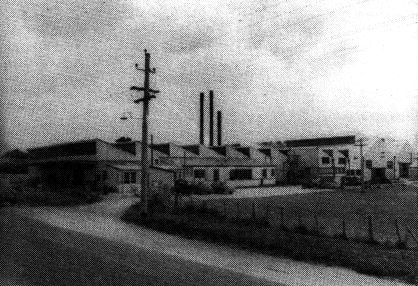
Early 1950's - (when I was Managing Director).
Now part of the Edgell Birdseye complex
We know what a wonderful asset the centre has been, not only to our district, but to the nation. The centre plans and packs the Defence Forces' food packs used in trial defence operations. It is the only one of its kind in the Southern Hemisphere.
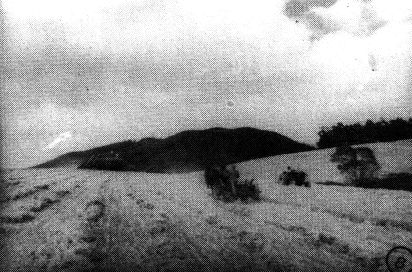
In these early days peas being cut and raked
ready for loading, now cut and shelled in one operation.
The early days of establishing the factory were very difficult for me, as I had been responsible for collecting most of the share money and felt responsible for it. While I had not really given any verbal undertaking that no-one would lose money, I realised that everyone involved did seriously think their money was safe - and some could not afford to lose it. People had faith in me, and thought I would not let them down.
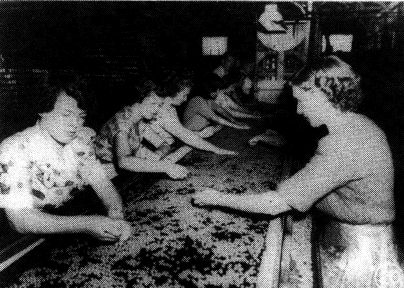
Girls checking peas on the conveyor.
It is very difficult to live up to everyone's expectations when things are really tough. I took my responsibilities so seriously that I was working hard and very long hours. I did not really worry that I was receiving no wages at all, because the little I received over the years would not have offset my out-of-pocket expenses. Establishment of the factory was first priority. Most of the time I received £1.7.6 a week, and near the end of my period as managing director I received £3.10.0 a week!
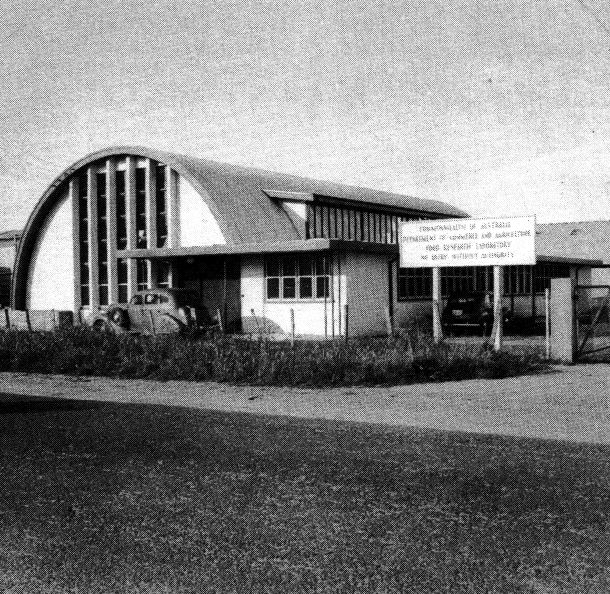
The first original section of the present Material Research Laboratory.
Most other factories can call on an associate company for help, techniques and experience; we had no factory or person we could call on. After we had overcome the worst of our problems I nearly collapsed. I just could not keep going and the doctor told me I had to get right away or my health would break up. He suggested I take a plane to Cairns. My brother Ron was good enough to go with me and we had a wonderful break, returning really refreshed.
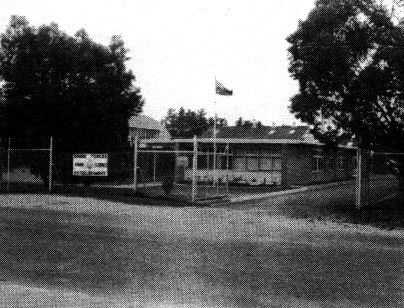
Section of the present extensive complex
We met some outstanding people on our trip. We met a very big, tough old timer, Tom Trembath on the plane and he asked us out to his property. He was a fantastic chap with a wonderful personality. Mrs. Trembath, young Tom, Grace and Mary were a vital part of his family.
There were many true stories about Tom Trembath and his
brothers. For instance, there was a picture in the Central Hotel at
Cairns of a man driving a cart through the streets of Cairns with a boar
pig in the shafts of the cart. Tom had accepted wager for £200 when
he was a youngster, that he could not go into the mountains, capture
this notorious wild boar and drive it through the town! Get Tom to
tell you about when the armed Trembaths went straight through the,
border guards without stopping, to get to the New Guinea gold rush
.
Tom said, That is an exaggeration. The guards were stopping
everyone, but they never asked us to stop. Of course we were all
heavily armed and young and we may not have stopped if asked, but
we were never asked!
Incidentally some of the latecomers could not peg claims on the supposedly rich New Guinea flats where the first gold strikes had taken place. They were therefore forced to peg on the hillsides where there appeared little likelihood of finding good gold, but they were the ones that struck it the richest and some became millionaires.
We were also asked to check with Tom about the time Ringer Smith poisoned a train load of his cattle. He again told us this was only half true - 'Ringer had poisoned and killed the whole train load of my big bullocks while they were being watered at the railway trough, but he said Ringer mistakenly thought they belonged to Sidney Kidman.
Ringer would not have poisoned them if he had known they were
mine. I asked what had he done to Ringer Smith. Nothing, because
Ringer made a mistake; he really thought the cattle still belonged to
Kidman!
However, I will show you both what a wonderful man
Kidman was. He showed us a letter.
Dear Tom, I only found out to-day that a train load of bullocks you bought from me two years ago was poisoned by Ringer Smith.
I enclose a cheque for the bullocks because Ringer would not have poisoned them if he had known they were yours.
Regards,
Sid Kidman
He quite rightly thought Kidman was a real old-time gentleman and a really great man. While I agreed entirely, I also privately thought Tom Trembath was also a great character to pay for a load of dead bullocks and not say a word about it to Kidman. It is fascinating to meet these tough old chaps whose word was their bond, and who would not moan or complain about a business deal whatever happened.
It is a great pity that these manly graces have partly disappeared.
While I have had no experience to equal Tom's, I remember paying for
a paddock of potatoes from George Hughes. I lost a lot of money on
the paddock. The following year I offered a price for a further paddock
and George said, The asking price is O.K. because you must have
made money on last year's deal.
I replied that I had not. He seemed
doubtful because he said I had not complained, which he thought I
would have done if I had not shown a profit!
While I do not consider myself of the same stature as Tom Trembath or Sidney Kidman, I have always stuck to any deal made and never tried to get out of it, although at times! could have done so with considerable benefit to myself.
I learned quite a lot more about cattle which was to help me later on with my cattle projects. I learned that in Queensland if pastures are eaten Out hard the natural grasses disappear and weeds take over.
With our pasture, if it is eaten hard, 'the better quality grasses will thrive. Rye grass, for example, thrives under these circumstances. If pasture is allowed to become rank, the inferior fog grass will flourish.
There is no doubt that factors affecting farming differ from state to state or even from district to district.